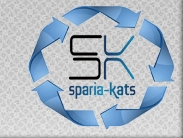Since early 2012, our company operates in the field of buying and recovery of catalysts and electrical (electronic) scrap. By an efficient logistical networking and cooperation with numerous global trading partners, including Korea, Pakistan, Gambia, Saudi Arabia and Belgium we are able to recycle the contaminated sites professionally and environmentally safe at their destination to perform. Aside from importing electric ( nik) scrap for example from Pakistan and some African countries now also includes the purchase of catalysts and electrical (electronic) components of all kinds here in Germany for the spectrum of activities SPARIA-KATS . We have for this purpose in a warehouse in Nidda (At Station 8, 63667 Nidda) own purchasing center opened in which the delivery by prior appointment by telephone (06043 9886177) or email (info@sparia-kats.com) done can. Also a collection from the customer is of course negotiable possible. we offer to sellers in addition to a professional service and a smooth settlement attractive rates and purchase prices than the market, which in appropriate amounts / quantities and high quality recycled materials (eg catalysts with high precious metal content) adjusted upward even can be.
Computer scrap
Nearly all devices with electronic components in addition to polluting substances that must be disposed of properly, valuable nonferrous metals and so-called rare earths, which for industrial production processes in numerous future technologies are vital. Especially against the background that the vast majority of these rare earths outside of Europe, especially in China, is degraded by complex conveying processes and Germany as the entire Western world, therefore, is dependent on imports, is electrical (electronic) scrap an indispensable secondary raw material of high economic value. The recovery of rare, precious and nonferrous metals is therefore together with an environmentally sound disposal of environmentally harmful materials, the central concern of businesses in the recycling and waste management industry in the recycling of used electrical (electronic) scrap.
Environmental protection through recycling
The recovery of precious and rare metals from mobile phones, cars
or laptops - the so-called "urban mining" - is not only very interesting economic aspects. The professional preparation and recycling of mobile phones or computer boards also has a much more favorable eco- and energy balance than about the conventional mining. Due to significantly lower energy and water consumption recycling makes consumer electronics and communication devices as an active contribution to protecting the environment and climate protection as ine by e noticeable reduction of carbon dioxide emissions. However, the enormous potential of recyclable precious metals Electrical (electronic) scrap far from being consistently exploited. So only an estimated 10 to 15 percent of all are far discarded handsets recycled by modern standards worldwide, not least because a large part of the costs incurred in the industrialized nations Electrical (electronic) scrap to Africa or Asia exported there but mostly in primitive recycling plants and using highly toxic substances such as cyanide or mercury "prepared" is. This questionable practice pollutes the environment heavily and endangers the health of persons employed in the establishments concerned workers. Because of these shortcomings, companies that strive research institutes, UN agencies and governmental development agencies for years about the basics for the establishment of an efficient and environmentally sustainable global recycling economy create a safe and environmentally ensure defensible recycling of used electrical (electronic) scrap is. However, a realization of this mammoth project is still in the distant future, even though it certainly already are concrete efforts, through cooperation between industrialized, emerging and developing countries an internationally operating, optimized to build circular economy. The reality is (still) different and often unsatisfactory from: 130,000 cars annually example to West Africa shipped and there "recycled", although a functioning treatment infrastructure as platinum, palladium or rhodium there is usually not available. It is therefore not surprising that the return rate of these metals as well as other secondary raw materials extremely low and thus ultimately valuable resources despite their high wasted metal value.


 Member
Member